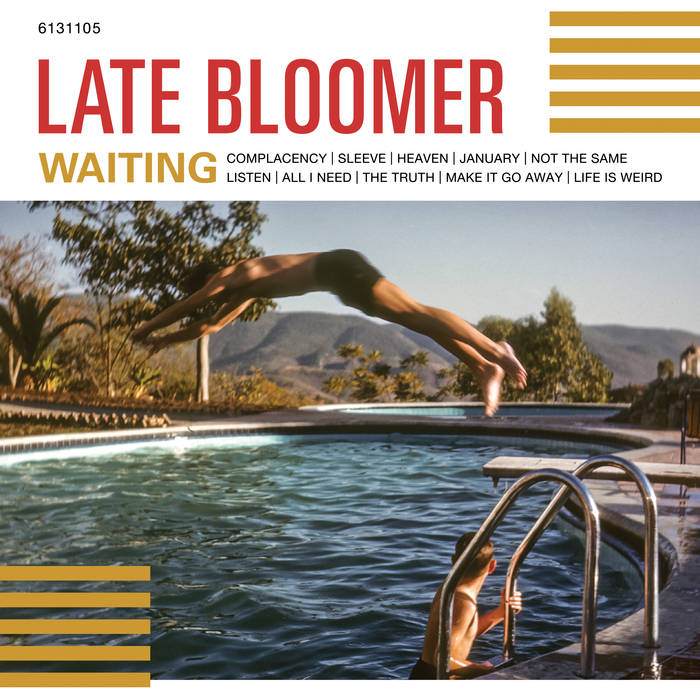by Gordon Phillips (@gordonmphillips)
Waiting, Late Bloomer’s aptly titled debut album for 6131 Records (Julien Baker, Suburban Living, Kindling) arrives today, June 29, 2018, almost four years exactly after the release of their prior full-length, Things Change.
credit: Brian Twitty
“I think a lot of life stuff [happened],” explained Josh Robbins, vocalist/bassist for the Charlotte, North Carolina three-piece, when asked about the delay between his band’s releases. “I started a job and then lost that job six months later.”
An oasis of shimmering clean tones usher in the record’s opener, “Complacency,” before Waiting’s foundational stereo pair of distorted guitars make their juxtaposed entrance. “I should have died in the sand/Some say I was saved by God’s hand/What makes me better than my friends?” posits the verse.
Post-religious lyrical content resurfaces across Waiting in other songs like “Heaven” and “Listen,” but both Robbins and vocalist/guitarist Neil Mauney insist that any thematic consistency is merely a product of shared experiences as opposed to an conscious, coordinated planning. “I don’t think me and Neil really talked about it, but I guess we were just kind of going through the same stuff in life and that informed [the record],” said Robbins. “There was never intentionally a theme, but I think there is some sort of theme about morality,” said Mauney. “There are songs like ‘Sleeve,’ which is one of Josh’s songs.”
Drummer Scott Wishart’s confident accompaniment comes to a full halt before propelling “Sleeve’s” anthemic chorus: “Two sides to everything/It’s not as easy as you think” Robbins repeats while Mauney’s guitar layers blur the line between lead and rhythm, dashing jeering open strings against shifting chord shapes.
“‘Sleeve’ is about how songwriting as a whole is usually from a male perspective,” explained Robbins. “I don’t want to just pick on emo stuff, but I guess that’s what we’re most closely associated with – it’s always like someone’s girlfriend did something that made them upset. If it’s Saves The Day lyrics, she then needs lemonade thrown in her face or something – but what did he do? What’s the other side of the story?”
“Not to pick on Saves The Day,” Robbins is quick to add. “We’d love to go on tour with you.”
Late Bloomer recruited Justin Pizzoferrato (Dinosaur Jr., Pixies, Parquet Courts) to produce Waiting and the genre stalrwart’s influence is palpable. Pizzoferrato’s sonic hallmarks shine across the record without compromising the unique aspects of Late Bloomer’s sound. Instrumental performances and vocal deliveries are faithfully captured and carefully situated in the mix. “Justin was amazing to work with,” said Robbins. “He can trick you into doing something like 10 times without feeling like you’re exhausted—really gentle, but also very persuasive.”
Pizzoferrato’s influence is perhaps best felt when paying close attention to Mauney’s guitar tracks. Hard stereo-paired electric guitar tracks serve as a building block for the majority of Waiting, sometimes tracked perfectly in tandem, other times departing only to harmonize, other times playing completely different parts or dropping in and out for dramatic effect. Hearty portions of distortion ring and squall, corralling feedback to great dynamic effect on songs like “January” and “Heaven.” It should also be noted that Mauney is absolutely willing to haul off and play a good, old-fashioned guitar solo on songs like “Make it Go Away” or "Listen,” a propensity that Pizzoferrato dutifully captures.
Across Waiting, one of Late Bloomer’s recurring strengths is its deliberate management of dynamics throughout a song structure. Cuts like “Heaven” and “Life is Weird” carefully plod and meander through the verse before opening up into sprawling sing-along choruses—this band is not afraid to write a hook.
When asked about Late Bloomer’s partnership with 6131 Records, Robbins said: “we come from punk and hardcore, so we were looking at them as a label because they were also kind of shifting out of that.” Although the band wrote 17 songs prior to entering the studio, the 10 guitar rock songs that Late Bloomer ultimately selected to make up Waiting reflect this ethos. Mostly weighing in around the three-minute mark, Waiting’s tracks evince experienced musicians that have seen change, accepted it and found a unique identity in spite of it. “There’s been a lot of changes to the neighborhood where most people play [in Charlotte],” said Robbins. “The neighborhood is called Plaza Midwood and there are condos everywhere when it didn’t used to be that way. Some venues have closed because of it—stuff like that does have an effect.”
“A theme of the record seems to be listening more than talking,” said Robbins. “Viewing things from another perspective and the way you fit in while getting older and just trying not to say that any one perspective is completely the truth.” Fortunately for music consumers, after four years of listening, Late Bloomer has found its voice.


